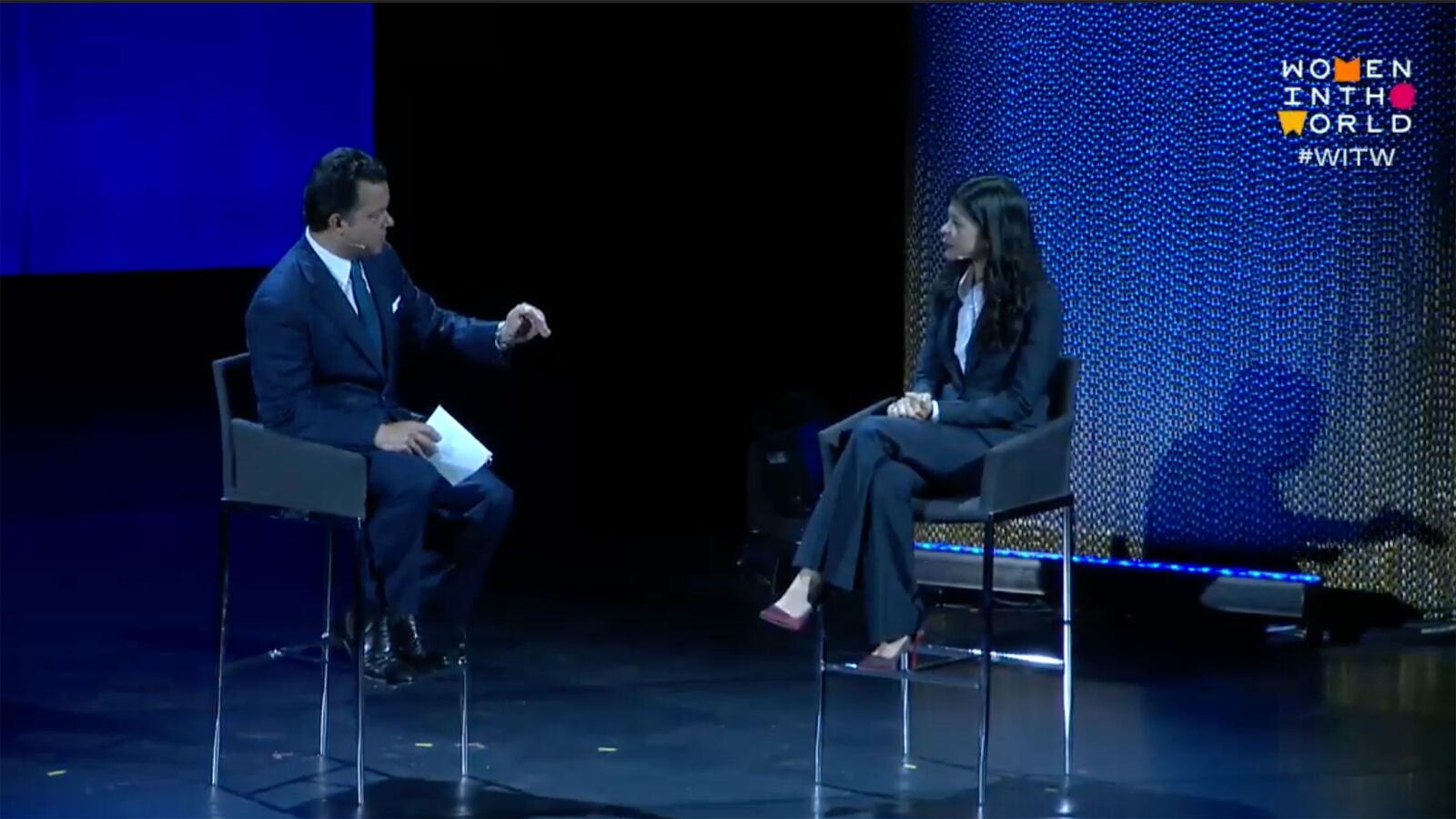NEW YORK—Philippine journalist Patricia Evangelista does not think a single story she has written has saved anyone’s life, but yet she keeps writing. Her stories about the Philippines' deadly war on drugs for the online-news network Rappler chronicle murder in cold blood, often carried out in front of families with young children by vigilantes acting out the wishes of the state under Philippine President Rodrigo Duterte.
Rappler has been stripped of its official credentials and investigated for bogus crimes, including tax evasion and cyber libel. Evangelista has personally received death and rape threats for reporting the truth and for trying to humanize the victims.
She described her disturbing work to John Avlon, editor-in-chief of The Daily Beast, at the ninth annual Women in the World summit in New York on Friday morning against a backdrop of photos of dead bodies and blood-stained sidewalks. “Duterte is sensitive to criticism, so those of us who cover stories are told we are not patriots, that we are fake news,” she said.
No one knows exactly how many people have died in Duterte’s war on drugs. The state officially lists the number at around 4,000 people who were killed by police acting in “self defense.” Human Rights Watch estimates that closer to 12,000 people have been murdered in cold blood by police and vigilantes.
Duterte, who enjoys a high approval rating, won his office by promising to kill 100,000 criminals who are pushers and drug users alike. He makes no differentiation between pushers, addicts, and casual users—and those who are killed are often never arrested, and certainly never brought to trial.
Those who do the killing aren’t always police, sometimes they are men working under curious impunity who are never brought to justice, either. There are around 16,000 “killings under investigation” by Philippine authorities, but Evangelista says there is no transparency about those cases.
The killings are often carried out in broad daylight in the slum areas of Manila. The victims are often on a watch list created by the government, which is suspected of paying the vigilantes for each person killed. Evangelista has reported on men who have been shot bound and gagged with packing tape wrapped around their heads. The killers generally leave a note with the body stating that the victim was an addict or pusher. Evangelista recalled one instance in which the killer had drawn a smiley face on the victim’s corpse. Other bodies have been found with hashtag-laden signs that parody internet memes.
Evangelista says that, in reality, the Philippines has half the global average of per capita drug abuse. But when the country's anti-drug czar reported this statistic, he was fired. What disturbs Evangelista most is that many of the killings target those living in extreme poverty, who are often the primary breadwinners for their families. When those victims die, the future of whole families dies with them.
She recalled a story about a family of six that lived in a cinder block house in a shantytown in the poor suburbs of Manila. The mother, nine-months pregnant, was home with the children one day when the police came looking for the patriarch of the house. He wasn’t home, so police arrested the pregnant woman and took her away instead. When the father returned, the family urged him to leave, too, or he might be killed. He came back early one morning to prepare a surprise birthday breakfast for one of the children. Police, staking out the house, charged in and told the children to get out. They pushed the father's head down on the sofa, and the second eldest child, Christine, then 12 years old, jumped on her father’s back to try to protect him. Police pulled her away and shot him in the back of the head several times. One of the children later found a bullet in the cushions of the sofa. When Evangelista talked to the traumatized daughter some months later, she said her father’s death was her fault. “If I had hugged him harder, he would still be alive,” she told her.
The family now lives with an elderly grandmother who doesn't have the financial means to support them. The mother gave birth, but remains in jail, meaning there is one more mouth to feed. It was never clear whether the father had been a user, a dealer, or neither. The official police report identified the father as a “scavenger” and said he was shot because the police were acting “in self defense.” There were no reports of police injuries, and no one official ever talked to Christine, the only witness.
Duterte has been condemned by the international community—which has called his deadly policy a crime against humanity—but Evangelista says the president's response has always been to ask, “Frankly, are they human?”
Evangelista says the hardest part about telling stories about this bloody war on drugs is the risks those who talk about it face. “The risks for the people who tell their stories are enormous,” she said. “They could be dead the next day. Or their fathers or sons could be dead.”
She is also concerned that journalists are increasingly afraid to expose the truth. She has little optimism things will ever get better. “I’m not sure about hope,” she said. “But I believe in journalism. If we tell the stories, we keep them human. They are people. He may have been a user, he may not have been, but he was a human.”





